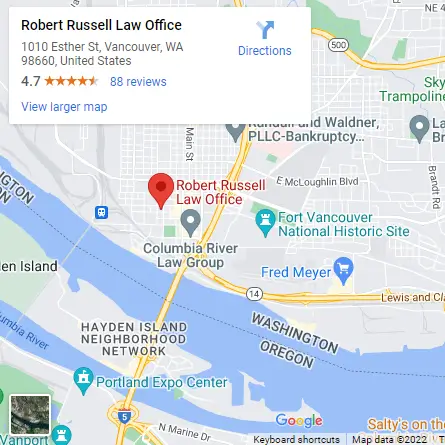The Question
If spouse #1 incurs a debt, is spouse #2 liable for that debt. The answer is, of course, it depends.
A Little Background: Separate vs. Community Estate
Washington is one of nine “community property” states. Generally, that means that when two people marry, they have their separate estates (pre-marriage), but they also create at marriage a “community” estate. As a result, after marriage, assets acquired can be owned and debts incurred can be owed by three different potential “entities”. They can be owned/owed by: (1) spouse #1 in his/her separate estate, (2) spouse #2 in his/her separate estate, and/or (3) the “marital community”.
The Answer
As a general rule, one spouse cannot incur separate debt for the other spouse without approval. However, one spouse can incur debt for their marital community. This occurs when the debt incurred is for the benefit of the marital community. For example, if spouse #1 buys a car to get to work to earn money for the martial community, then the vehicle debt is likely “community” debt. Spouse #1 also creates personal separate debt in borrowing the money. When a spouse’s act creates community liability, it is enforceable only against community property and acting spouse’s separate property.
However, if spouse #1’s acts create an obligation is for what it described as a “family expense”, then spouse #2 also acquires separate liable for the family expense. As a result, the “family expense” obligation can be enforced against separate property of the spouse #2 even though other spouse alone incurred the debt. See, RCW 26.16.205 (copied below).
Family expenses are, generally, interpreted to include at least expenses for the “necessaries” for the family. “Necessary” expenses have been held to include food, shelter, medical care, education costs, criminal defense costs. Here are a few examples taken from Washington court decisions.
- Phrase “expenses of the family and education of the children” is broad enough to include “necessaries,” which in turn includes necessary medical expense of dependent minor children.
- This section was not intended to make every article of personal property purchased by wife and used in connection with the family a family expense; and while husband may not deny to his family necessities of life or to his children an education, he must have large voice in determining whether community and his separate property shall be liable for proposed expenditure which goes beyond necessities.
- Expenses of the family include not only merchandise used by the family as a whole, but also expenses, such as medical aid, hospital services and burial attendance, incurred or supplied for the immediate or personal benefit of a spouse.
- Expenses of the family include expense incurred for the necessary and actual maintenance and support of an aged and indigent husband, provided that the marital relationship has not been severed and that there has been no intentional separation.
- The expenses of defending a criminal prosecution against a spouse where the spouse’s liberty is at stake and of taking an appeal from a conviction in such a prosecution are family expenses within the meaning of this section, which makes family expenses chargeable to the separate property of either spouse.
- Wife’s separate estate is liable for funeral expenses of husband, he having left no property, where services were rendered with her knowledge and consent
- Where relation of husband and wife ceased by mutual agreement between spouses, but to public they were still husband and wife, husband was liable for bills for necessities and medical treatment.
- Residential lease agreement signed only by husband was obligation incurred as family expense, and therefore wife was jointly and severally liable for the lease obligation even after her divorce from husband; lease agreement had been necessary at time to ensure housing for the marital community.
- Purchase of ski boat by husband prior to separation from wife was not “expense of family” within scope of this section which would have created separate liability on part of wife.
- Separate estate of insane wife was liable for necessary and actual support of aged and indigent husband, even though spouses were not living together, where marital relationship had not been severed and there was no intentional separation; and accrued debts for such husband were “family expense.”
- Where wife purchased piano on her own behalf after husband had refused to consent to purchase, it was not chargeable to community or husband “as expenses of the family and education of the children,” since he had control of the community and his separate property was not liable for her separate debts.
Conclusion
As a general rule, spouse #1 cannot create a separate obligation for spouse #2 unless it is for a “family expense.” However, spouse #2’s share of community property can be liable for community debt incurred by spouse #1.
If you have a situation you need sorted out, you know how to reach us. I have copied the controlling statute below.
————————————————————————————————
26.16.205. Liability for family support–Support obligation of stepparent
26.16.190. Liability for acts of other spouse or other domestic partner.
For all injuries committed by a married person or domestic partner, there shall be no recovery against the separate property of the other spouse or other domestic partner except in cases where there would be joint responsibility if the marriage or the state registered domestic partnership did not exist.






